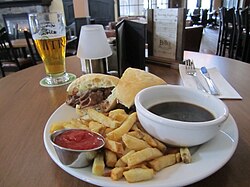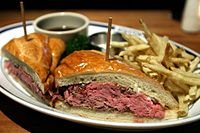French dip
 Roast beef dip au jus, with french fries | |
| Alternative names | Beef dip |
|---|---|
| Type | Sandwich |
| Course | Main |
| Place of origin | United States |
| Region or state | Los Angeles, California |
| Created by | Multiple claims |
| Main ingredients | Baguette, roast beef, beef broth |
| Variations | With cheese |
A French dip sandwich, also known as a beef dip, is a hot sandwich consisting of thinly sliced roast beef (or, sometimes, other meats) on a "French roll" or baguette. It is usually served plain but a variation is to top with Swiss cheese, onions, and a dipping container of beef broth produced from the cooking process (termed au jus, "with juice"). Beef stock, a light beef gravy, or beef consommé is sometimes substituted. The sandwich is an American invention, with the name seeming to refer to the style of bread, rather than any French origin. Although the sandwich is most commonly served with a cup of jus or broth on the side of the plate, into which the sandwich is dipped as it is eaten, this is not how the sandwich was served when it was invented.
Two Los Angeles restaurants have claimed to be the birthplace of the French dip sandwich: Cole's Pacific Electric Buffet[1] and Philippe the Original.[1][2] Philippe's website describes the dish as a "specialty of the house", and the words "Home of the Original French Dip Sandwich" are present in the restaurant's logo. At Phillippe's, the roll is dipped in the hot beef juices before the sandwich is assembled, and is served "wet", while at Cole's it is served with a side of beef juices. The sandwich can also be requested "double dipped", where both halves of the sandwich are dipped before serving, at either establishment. Both restaurants feature their own brand of spicy mustard that is traditionally used by patrons to complement the sandwich.[2]
The controversy over who originated the sandwich remains unresolved. Both restaurants were established in 1908. However, Cole's claims to have originated the sandwich shortly after the restaurant opened in 1908, while Philippe's claims that owner Philippe Mathieu invented it in 1918.[1]
The story of the sandwich's invention by Philippe's has several variants: some sources say that it was first created by a cook or a server who, while preparing a sandwich for a police officer or fireman, accidentally dropped it into a pan of meat drippings. The patron liked it, and the dish surged in popularity shortly after its invention. Other accounts say that a customer who didn't want some meat drippings to go to waste requested his sandwich be dipped in them. Still others say that a chef dipped a sandwich into a pan of meat drippings after a customer complained that the bread was stale. Cole's account states that the sandwich was invented by a sympathetic chef, Jack Garlinghouse,[3][4] for a customer who was complaining of sore gums. Some accounts tell Philippe's version of events, but assign the location to Cole's. The mystery of the sandwich's invention might not be solved due to a lack of information and observable evidence.[1]
The French dip is now served at a number of restaurant chains including fast food places, diners, and standard restaurants. A sandwich based on a similar concept is known as a Baron of beef.[5][6]

A French dip

French dip, with bowl of jus for dipping
See also[]
- Beef on weck
- Cheesesteak
- Italian beef, a similar sandwich which is dipped in the juices
- List of American sandwiches
- List of sandwiches
- Roast beef sandwich
- Steak sandwich
References[]
- ^ a b c d Mikkelson, Barbara; Mikkelson, David P. (March 10, 2009). "French Dip Sandwich Origins". Snopes.com. Retrieved May 23, 2012.
- ^ a b "History". Philippe's the Original. Archived from the original on May 24, 2012. Retrieved May 23, 2012.
- ^ Harvey, Steve (1993-10-14). "Dueling dips: The claim of Philippe the..." Los Angeles Times. Retrieved 2021-07-14.
{{cite web}}: CS1 maint: url-status (link) - ^ Hutson, MacKenzie (August 6, 2019). "Invented in California: The French Dip Sandwich". www.california.com. Retrieved 2021-07-14.
{{cite web}}: CS1 maint: url-status (link) - ^ "Baron of Beef Sandwich". Country Grocer. Retrieved 2021-07-14.
- ^ "Baron of beef sandwich". Ten More Bites. 2015-12-23. Retrieved 2021-07-14.
External links[]
| Wikimedia Commons has media related to French dip sandwiches. |
- American sandwiches
- Culture of Los Angeles
- Cuisine of the Western United States
- French-American culture in California
- Beef sandwiches
- Hot sandwiches



